Declaring Independence
"When in the Course of human events, it becomes necessary for one people to dissolve the political bands which have connected them with another, and to assume among the powers of the earth, the separate and equal station to which the Laws of Nature and of Nature's God entitle them, a decent respect to the opinions of mankind requires that they should declare the causes which impel them to the separation."
By the spring of 1776 a series of astonishing events-the Boston Tea Party, the closing of Boston Harbor, the hostilities at Lexington and Concord, the Gunpowder Incident in Williamsburg, and the Battle of Bunker Hill-had transformed the political landscape. George III proclaimed the colonies to be in open rebellion, and Thomas Paine's pamphlet Common Sense, published in January 1776, attacked monarchical government and called upon the American colonies to declare themselves free and independent. A battle had been fought and won in Virginia, and the port city of Norfolk had been fired on by the British fleet with nine hundred houses destroyed by the fires started by the cannonballs. After the defeat of Lord Dunmore at Gwynn's Island on July 9, before Virginia had received notification of the Declaration of Independence, the British left Virginia.
- May 29-30 1765
-
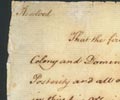
Patrick Henry's Resolutions
Patrick Henry's Resolutions condemn the Stamp Act.
View this Document - April 16 1768
-
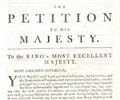
Virginia House of Burgesses Petition
Virginia House of Burgesses oppose the Quartering and Townshend Acts.
View this Document - December 16 1773
-
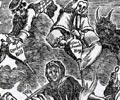
Boston Tea Party
The Boston Tea Party protests the tea tax by dumping 340 chests of tea into Boston Harbor.
Read More - March 31 1774
-
Boston Port Act
Parliament passes the Boston Port Act, closing the port to all trade as of June 1. This was the first of Britain's "coercive acts".
Read More - June 1 1774
-
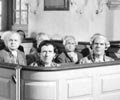
Day of Fasting, Humiliation and Prayer for Boston
In support of their fellow citizens in massachusetts, the Virginia House of Burgesses resolves that June 1, 1774, be a day of Fasting, Humiliation, and Prayer.
Read More - August 1-6 1774
-
The first Virginia Convention meets in Williamsburg and adopts an Association forbidding trade with Great Britain.
- November 7 1774
-
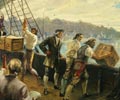
Yorktown Tea Party
Locally, the Yorktown Tea Party supports non-importation by throwing two half-chests of tea, imported by John Prentis & Company of Williamsburg, into the York River.
Read More - February 1775
-
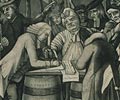
The Alternative of Williamsburg
Williamsburg offers loyalists an uncomfortable alternative.
Read More - April 19 1775
-
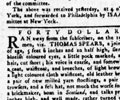
Battles of Lexington and Concord
View this Document - April 20 1775
-
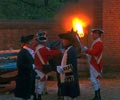
The Gunpowder Incident
Fearing the worst, the royal governor of Virginia, Lord Dunmore, orders his forces to remove the gunpowder from the Magazine at Williamsburg.
Read More - June 8 1775
-
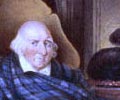
Lord Dunmore
Lord Dunmore flees the Governor's Palace to the ship Fowey docked at Yorktown.
Read More - November 14 1775
-
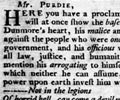
Dunmore's Proclamation
Lord Dunmore issues a Proclamation offering freedom to slaves who leave their patriot masters and join the royal forces.
View this Document - December 9 1775
-
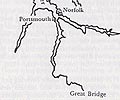
Battle of Great Bridge
Virginia patriot forces are victorious at the Battle of Great Bridge.
Read More - January 1 1776
- January 9/10 1776
-
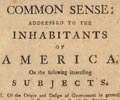
Common Sense
Thomas Paine's Common Sense is published.
View this Document